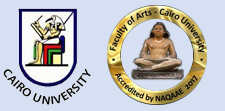عنوان المقال عربي
الذکاء اللغوي وسلطة النقد الأدبي وأثرهما في التجربة الشعرية
Document Type
Book Review
Keywords English
linguistic intelligence, Literary Criticism, Authority of Criticism, poetic experience
كلمات مفتاحية عربي
کلمات مفتاحية: الذکاء اللغوي, النقد الأدبي, سلطة النقد, التجربة الشعرية
Abstract English
Poetic experience is a complex creative process, the interpretation of which is still difficult, however this has not prevented searching for its two pillars (namely; linguistic intelligence and authority of literary criticism), and following up their impacts on it. The significance of this research is represented in the attempt to explore the relationship between the two pillars and their impact on poetic experience; starting form literary criticism and psychology, and in consistency with the contemporary research trends that focus on the unity and integration of knowledge. In order to answer the questions and achieve its goal, the research utilized the descriptive method, including an introduction, and two parts; a theoretical part that addressed the critical sayings that were concerned with that relationship and a practical one that dealt with procedures and testing hypothesis according to statistical analysis. The sample, in its final form, consisted of (34) of Gulf poets. Three instruments (prepared by the two authors) were used; Linguistic Intelligence Scale, Literary Criticism Authority Scale, and Poetic Experience Scale. The research concluded, after statistical analysis of data, that no poetic experiences can depend on one factor only, away from the other. The research found that the authority of literary criticism does not obstruct, nor slow down the creative process, rather it establishes an essential balance. The findings indicated the predictability of poetic experience by knowing the level of a poet’s linguistic intelligence and the degree of literary criticism authority impact on him. With respect to the poetic experiences of the Arab Gulf poets, the research found that the authority of literary criticism has an influence, more than that of linguistic intelligence, on the poetic experiences, however it has not been weakened by any sources of the critical mental ability that enlightens the way of creativity.
الملخص العربي
التجربة الشعرية عمليةُ خلقٍ معقّدة لا يزال تفسيرها عصيّاً، ولم يحُلْ ذلک دون البحث في مُقومَيها-الذکاء اللغوي وسلطة النقد الأدبي- وتتبع أثرهما فيها. وتکمن أهمية البحث في محاولة استکشاف العلاقة بين المقوّمين وأثرهما في التجربة الشعرية؛ انطلاقاً من علم النقد الأدبي وعلم النفس، واتساقاً مع التوجهات البحثية المعاصرة التي ترکّز على وحدة المعرفة وتکاملها. وليجيب البحث على تساؤلاته ويحقّق هدفه، اعتمد المنهج الوصفي، وجاء في مقدمة ومبحثين؛ نظريّ حاورَ المقولات النقدية التي عنيت بتلک العلاقة، وتطبيقي عُنيَ بالإجراءات واختبار الفروض وفق القراءة الإحصائية. وانتُخبت العينة في صورتها النهائية من (34) شاعراً خليجياً، واستُخدمت ثلاث أدوات من إعداد الباحِثَيْن: مقياس الذکاء اللغوي، ومقياس سلطة النقد الأدبي، ومقياس التجربة الشعرية. وقد انتهى البحث –بعد التحليل الإحصائي لبياناته- إلى أنه لا توجد تجارب شعرية تقوم على أحد المقومين دون الآخر، وإلى أن سلطة النقد الأدبي لا تعمل على تعطيل العملية الإبداعية أو إبطائها بل على إقامة توازن ضروري، وإلى إمکانية التنبؤ بالتجربة الشعرية من خلال معرفة مستوى الذکاء اللغوي لدى الشاعر ودرجة تأثره بسلطة النقد الأدبي. وفيما يتعلق بتجارب شعراء الخليج العربي، خلص البحث إلى أن لسلطة النقد الأدبي أثراً يفوق أثر الذکاء اللغوي، غير أنه لم يضعفها؛ وذلک کونها أحد روافد القدرة العقلية الناقدة التي تنير طريق الإبداع.
Recommended Citation
Al-Khamis, Abdul Rahman bin Saleh Abdul Rahman
(2019)
"Title: Linguistic Intelligence, Authority of Literary Criticism and their Impact on Poetic Experience,"
Journal of the Faculty of Arts (JFA): Vol. 79:
Iss.
4, Article 13.
DOI: 10.21608/jarts.2019.81817
Available at:
https://jfa.cu.edu.eg/journal/vol79/iss4/13
Digital Object Identifier (DOI)
10.21608/jarts.2019.81817
Accept Date
2018-04-12
Publication Date
10-1-2019

